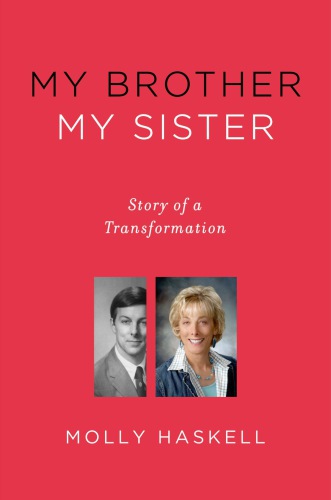
My Brother My Sister
Story of a Transformation
کتاب های مرتبط
- اطلاعات
- نقد و بررسی
- دیدگاه کاربران
نقد و بررسی

July 1, 2013
When noted feminist film critic Haskell’s “utterly normal” brother, Chevey, confesses his long-held desire to become a woman, Haskell sets out on a scholarly quest to understand her brother’s path to becoming Ellen in this intimate memoir. Approaching his 60s, following two marriages to women, Chevey simply states that he is going to “change.” Given Haskell’s background, it is not surprising she first tackles his transsexuality with academic rigor: what the book occasionally lacks in description, it compensates for in captivating, well-synthesized research, citing works from fields as varied as mythology, neuroscience, and religion. Haskell successfully employs these voices to aid her understanding of her brother’s surprising “second chance narrative.” Her personal tale of coming to terms with this surprise announcement and its aftermath shines through the research and references, becoming the memoir’s strongest thread. Coming from a well-to-do, conservative family in Richmond, Va., Haskell felt simultaneous grief for the brother she lost and acceptance of the sister she gained in a story of identity and the impossibility of fully knowing another person, even those closest to us. “You discover you don’t know the person you thought you knew,” an analyst tells Haskell. As the conversation surrounding the unknowns of what causes transgender continues, this work makes a significant contribution to its literature.

August 15, 2013
Feminist film critic Haskell (Frankly, My Dear: Gone with the Wind Revisited, 2009, etc.) delves into the dramatic, deeply personal tale of her brother's transformation, in his early 60s, from a man into a woman. Haskell's story opens in 2005, when her younger brother, Chevey, confessed, "For as long as I can remember, I've felt I should have been born female. And now I'm going to become one." Stunned, the author struggled to reconcile her knowing Chevey as a conservative and "manly" guy with his impending transsexuality. A semiretired financial adviser, Chevey appeared to be happily married to his wife of more than 20 years, but his desire to live as a woman had grown so fervent, he claimed that the only thing that would keep him from undergoing gender reassignment surgery was knowing he would die on the operating table. During the course of the book, Haskell's brother, her only immediate family other than her husband, becomes Ellen, the name Chevey called himself in his fantasy life. The difficult transformation required numerous surgeries, including multiple facial reconstructions, painful other procedures and a move across the country to start fresh as Ellen. Haskell's journey was obviously less arduous than Ellen's, but the two are equally compelling, in part due to the ways in which Ellen's choice acts as a catalyst for Haskell's initial discomfort, growth and acceptance. With candor and sly humor, the author questions her ideas about womanhood and considers the relationship between gender and identity as they relate to Ellen, herself, and myriad films and other aspects of popular culture. At the heart of this intelligent memoir lies the process through which Ellen's transsexualism became, then faded from being, the primary fact of the siblings' respective lives. A discerning, vital memoir.
COPYRIGHT(2013) Kirkus Reviews, ALL RIGHTS RESERVED.

March 1, 2014
Feminist film critic Haskell writes candidly about the journey her sixtysomething brother, Chevey, made to change his gender, becoming Ellen. She not only chronicles Ellen's life during transition, she describes her own journey to acceptance of her sister with wit and, of course, references to film and literature.
Copyright 2014 Library Journal, LLC Used with permission.

August 1, 2013
Well-known feminist film critic Haskell calls this a story of a transformation, which is accurate in a way, but on another level this is a story about emigration. Indeed, she refers to her sixtysomething brother Chevvy as a gender migrant after he tells her of his decision to leave his gender designation behind and travel through personally uncharted territory to become a woman. The decision meant he had to forsake not just his male organs via surgery but also all the familiar trappings and language of masculinity, to say nothing of his wife of two decades. And just as the family of any migrant must adapt to the idea of him in a new place, with a new aspect and language, Haskell had to either accept or reject Chevvy's sexual relocation, as it were. For the liberal-minded feminist, the adjustment wasn't as easy as one might expect. Because if Chevvy's course was uncharted, hers felt like leaping into a black hole. Haskell eloquently chronicles the emotional torrent both siblings suffered as brother became sister.(Reprinted with permission of Booklist, copyright 2013, American Library Association.)

























دیدگاه کاربران